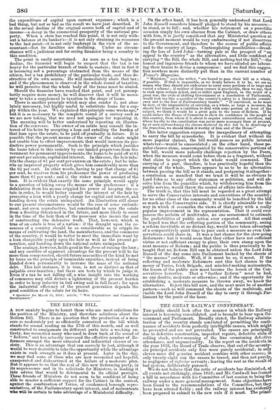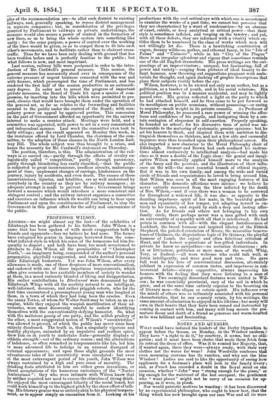THE GREAT RAILWAY CONFEDERACY.
THE public should look after the manner in which the Raffway interest is becoming consolidated, and is brought to bear upon Go- vernment and Parliament Broadly stated, the Railway adminis- tration of the country stands convicted of permitting the conti- nuance of accidents from perfectly intelligible causes, which might be prevented and are not prevented. The causes are principally due to defective construction, imperfect repairs, defective state of rolling stock, under-manning of the line occasioning defective attendance, and unpunctuality. In the report on the accidents in the year 1853, the Board of Trade observe, that out of the seventy- six principal accidents only five were purely accidental; in only eleven more did genuine accident combine with other causes; in only twenty-eight can the causes be traced, and then not purely, to negligence of inferior servants ; leaving the rest as the result of bad system, deliberately pursued.
:We do not believe that the ratio of accidents has diminished, at all events not strikingly, since 1853; and Mr. Cardwell has framed a bill in accordance with his Committee of last session to bring the railway under a more general management. Some objections have been found to the recommendations of the Committee, but they have been uttered feebly ; and the railway interest has evidently been prepared to submit to the new rule if it must. The rind- plea of the recommendation are—to allot each district to existing railways, and, generally speaking, to repose district management in separate companies ; but, in consideration of the privileges granted by Parliament to railways as private undertakings, the measure would also secure a power of control in the formation of new lines, so as to bring the whole system into something like unity : for the same purpose, a power of control over the working of the lines would be given, so as to compel them to fit into each other's movements, and to facilitate rather than to obstruct cross- traffic. Thus far we have been only dealing with ground- that has been trodden before and is perfectly familiar to the public ; but what follows is new, and most important. Last sesaion, railway bills were postponed in order to the intro- duction of Mr. Cardwell's general measure. This session, the general measure has necessarily stood over in consequence of the extreme pressure of urgent business connected with the war and with finance, which preoccupied the time of Parliament, and has rendered the first half of the session productive in an extraordi- nary degree. In order not to arrest the progress of important private measures, the Board of Trade hit upon a species of com- promise, by inserting into the bills which were permitted to pro- ceed,- clauses that would have brought them under the operation of the general act, so far as relates to the forwarding and facilities secured to the publio under the control of the Board; with com- pulsory power on appeal by aggrieved parties. This concession on the part of Government afforded an opportunity for the railway interest to make a counter attack. Meetings were held, and a committee was appointed, with power to act in a very concentrated and independent manner. Last week the committee even took to daily sittings ; and the result appeared on Monday this week, in the resistanee offered by Lord Chandos, the chairman of the com- mittee, to the adoption of those clauses in the North London Rail- way Bill. The whole subject was thus brought to a crisis, and hence the necessity for Mr. Cardwell's statement on Thursday. The position, therefore, is this. The administration of the rail- ways is so carried on,—partly through the effects of rivalry eu- logistically called " competition," partly through parsimony, partly through blundering less easily olassified,—that the public is subjected to great inconvenience, needless circuits, malarrange- merit of time, unpleasant changes of carriage, hinderances on the joarney, injury by accidents, and even death. The causes of these moonveniences, injuries, and fatalities, are as well understood by everybody in the country as they are by railway managers ; no adequate attempt is made to prevent them ; Government brings forward a measure which would introduce a more consistent and stringent control ; and the railway interest organizes a committee and exercises an influence which its wealth can bring to bear upon Parliament and upon the constituencies of Parliament, to stop the Government in this great effort for the safety and convenience of the public.



























 Previous page
Previous page